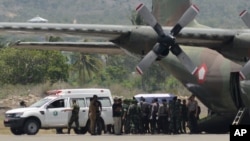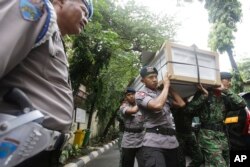Indonesian President Joko Widodo on Tuesday called for a full investigation of a deadly helicopter crash that occurred during counterterror operations along the northeastern coast of Central Sulawesi province.
Military and civilian eyewitness accounts say the Bell 412-EP helicopter, one of two deployed in a special mission to hunt Santoso terrorists, went down in foul weather some 35 minutes after taking off from Watutau village, killing all 13 soldiers and crew.
Indonesia's third deadly aviation catastrophe in as many months, Sunday's crash prompted numerous high-level officials to issue statements speculating about the cause.
"Initial reports [indicate] the helicopter crashed because it was struck by lightning, not human error and not because of mechanical failure," presidential spokesman Johan Budi told VOA, contradicting claims by local police that the helicopter may have been overloaded.
"When the helicopter was over the area, based on the agency weather monitoring system, we relayed information that cumulonimbus clouds were affecting weather, with the potential of heavy rain, high winds, tornado, lightning and hail," said meteorologist Kukuh Ribuduyanto.
Indonesian Police Chief Badrodin Haiti confidently ruled out a terror attack, telling reporters the site of the crash "is not a vulnerable area, [but] a residential area near the airport."
Budget blamed
Parliamentarian Mahfud Sidiq, who chairs the security and foreign affairs commission, cited maintenance funding shortfalls as a possible culprit.
"With our current budget we could only buy modern equipment, but we could not allocate a budget for their maintenance and service," he told VOA. "That's what caused some of the accidents in the weaponry systems."
Minimal budgetary allocations for military weaponry systems were blamed as a cause of a prior military plane crash. The Bell-412 EP that crashed in Poso was built by an Indonesian company with a license from U.S.-based Bell Helicopter.
Defense Minister Ryamizard Ryacudu urged all parties to refrain from further speculating on the cause of the crash, calling it "the responsibility of the defense department to investigate the case thoroughly."
"We'll have to wait and see. Was it engine failure or the weather? Those questions have not been answered," Ryamizard said. "I'm astonished, why do they crash so often?"
Witness to crash
A 60-year-old farmer told VOA he saw the chopper going in circles over his house before diving suddenly among coconut trees.
"We saw the chopper, but we didn't hear it too clearly," said Hassan, describing the weather at the time of the crash as dark and cloudy. "We saw when it was circling over our house. A neighbor was wondering why the chopper was flying that low and then it nosedived — we heard a loud explosion and it disappeared."
One victim of the crash, Army Colonel Sinful Anwar, was a deputy commander of counterterror operations in Poso, where more than 2,500 security forces — including elite army troops — have intensified search efforts throughout the mountainous district, which is considered an extremist hotbed.
Anwar's troops had been aggressively pursuing Abu Wardah Santoso, Indonesia's most wanted militant and leader of the East Indonesia Mujahidin (EIM) network, which has pledged allegiance to the Islamic State group.
At least five members of the EIM network were killed by security forces this past week. Members of the group are thought to be hiding in Poso, where more than 1,000 people died in 2001 and 2002 in violence between Christians and Muslims.
Indonesia, a sprawling archipelago nation of about 250 million people, has been plagued by transportation accidents in recent years, including plane and train crashes and ferry sinkings. On Feb. 10, an Indonesia Air Force Super Tucano fighter plane crashed in a densely populated area in Malang, killing 4 people. In December 2015, a military T-50 fighter plane crashed during the Gebyar Jogja Airshow in Jogjakarta.
This report was produced in collaboration with VOA's Indonesia Service.






